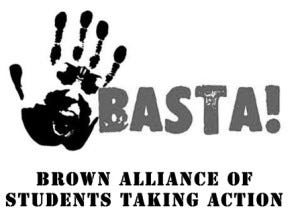In a dimly lit classroom, the Brown Alliance of Students Taking Action (BASTA) humbly began its first meeting of the semester on Oct. 1.
Though the turnout was only a handful of students, and the meeting had a shy start, the mission statement of the group was confident and clear.
“[BASTA is] a multiracial alliance of students and allies focused on addressing and magnifying…the issues affecting Laney’s Latino student population both on and off campus,” said Latin-American studies instructor Alicia Caballero.
Caballero, along with students Jhovana Perez and Miguel Avila, organized and directed the first group meeting.
BASTA, which means “stop” in Spanish, has roots that can be traced to the 2013 spring semester.
Originally, former Laney student Adan Ortega approached Caballero with the idea of creating a student alliance based on the principles of Movimiento Estudiantil Chicana/o de Aztlan (the Chicanos/Chicanas of Aztlan Student Movement, or MEChA).
MEChA is a national student organization with affiliated chapters on multiple college campuses around the U.S. But the primary focus of MEChA is on Chicano unity and empowerment, and the founders of BASTA wanted a broader membership.
“[W]e decided that we wanted it to go beyond just Chicano students, but to be an all-inclusive Latino and multicultural group,” said Caballero.
Thus, BASTA was born.

The first BASTA meeting of this semester was a preliminary brainstorming session for members to get an idea of the fundamental goals of the group and how it could be organized.
Among the topics discussed were a proposed structure of the alliance, issues that affect Latina and Latino students, and possible upcoming events in which BASTA could participate.
Immigration, incarceration, and police brutality were some of the major issues that Caballero said the group should address.
Also discussed was sending representatives of BASTA to ASLC meetings to provide a voice for Latino students at student government meetings.
Perez outlined the organizational structure of the group that she, Caballero, and Avila had envisioned.
The suggested structure involved several coordinators that could manage the functions of BASTA, including finances, community outreach, and assisting student members in transferring to universities.
BASTA plans to be involved in the Oct. 29 campus celebration of Dia De Los Muertos. Tentative plans for a film screening with special guest speakers were discussed as well.
In spite of the modest turnout of the first meeting, the group’s organizers were unabashed.
Perez and Avila directed the meeting with a casual confidence indicative of veteran organizers, and Caballero’s optimism for the future of BASTA was apparent.
“I’m hoping that… as we get bigger and we get a bigger membership, we can actually be a large force on campus,” said Caballero.
BASTA’s membership was around 20 students during the 2013 spring semester, and since their first meeting, they now have close to 40 potential members.
BASTA meetings are held on Tuesdays at 12 p.m. in room F 201, and BASTA is always looking for new students to expand their membership.
For more information on BASTA, email Caballero at [email protected].

























